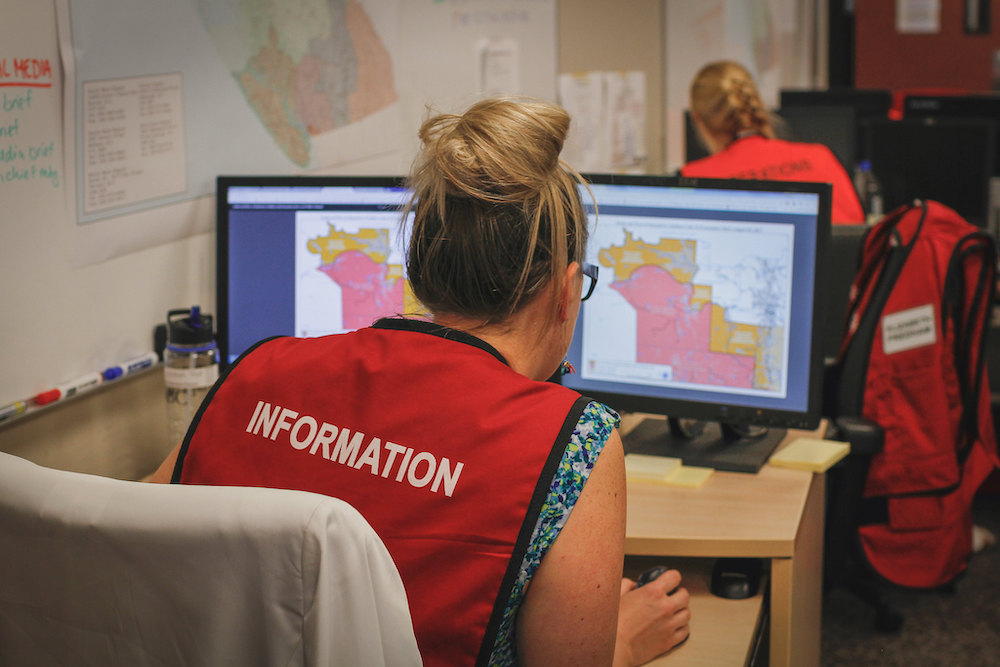
Bridging the Gap: Research impact in emergency management
March 20, 2023
By Simon Wells
Explaining why your scholarship matters to the people on the ground is a path to emergency management innovation, writes Simon Wells.
 Emergency response crew team member pores over wildfire data. Photo by Province of BC.
Emergency response crew team member pores over wildfire data. Photo by Province of BC. In my last column, I explored what “policy with teeth” could look like and made some specific if only hypothetical suggestions. In this column, I want to speak to scholars. Every scholar wants their research to matter, so professional scholars will already know what research impact is. This column will suggest ways to design and conduct impactful research, and then mobilize the insights its produces.
A wise and passionate scholar once confided in me that their “heart is in the methodological appendix.” What they meant is that their focus and passion is in the how of research, not just the what or why. Real research is science, and it follows a scientific process. I won’t presume to lecture scholars on process.
But much like policy often omits practitioners’ perspectives, scholarship often forgets them too. Methodologies could include surveys of experienced practitioners, or meta-analyses of after action reports (AARs). These sources may include some opinion, but no single observation is ever automatically treated as fact. And almost no individual research paper or project ever produces a definite finding: they usually make a contribution to a research or suggest further study. Interviewing or surveying practitioners, or analyzing their AARs, is an easy way to provide additional context to a research protocol or a literature review.
Qualitative data can be limiting. There is ample quantitative data about disasters and emergencies out in the world, ranging from COVID-19 case counts to service delivery data from large organizations and governments (if they can be convinced to provide it!). Even the simplest linear, public-facing data can tell a researcher important things about how well emergency management systems responded to disasters. When was an intervention promised? And when was it delivered in full effect?
An action research methodology could help a researchers and practitioners at the same time. Why not test a hypothesis out with an innovative organization, starting off in a low-risk setting and managing research (and organizational change) together for immediate effect?
These suggestions are about exploring research problems in practical ways. Scholars need to mobilize their research findings practically, too. Publications like the Canadian Journal of Emergency Management and Avert help us share information in our community of practice. But there isn’t always time to read the latest article, and not everybody finds reading effective. The Emergency Preparedness in Canada (EPIC) podcast is a respected medium to share information through, in a conversational tone. I listen to new insights on emergency preparedness while I’m out for a run!
We also need to acknowledge the importance of data visualization. Can you share your scholarly work in a concise visualization or a dashboard? Can anybody at any level of their career understand why your work is important?
We’re collecting, analyzing, and sharing more information than ever before. Scholars need to explain why their work matters to the people on the ground so that it is easy to adopt, so that practitioners find it easy to say “yes” to innovation.
 Simon Wells is the principal of the Canadian Journal of Emergency Management. He has emergency management operations and program experience at multiple levels of government and holds multiple certifications and degrees. Simon lives in Scarborough, Ont.
Simon Wells is the principal of the Canadian Journal of Emergency Management. He has emergency management operations and program experience at multiple levels of government and holds multiple certifications and degrees. Simon lives in Scarborough, Ont.
Print this page